THE PERSON BEHIND THE ACT: SAVANNA LAFONTAINE-GREYWIND

Savanna LaFontaine-Greywind, an enrolled member of the Spirit Lake Nation of North Dakota, was brutally murdered in August of 2017. At the time of her death she was only 22 years old, as well as eight months pregnant. She died from blood loss when her assailants cut her infant from her stomach. Her body was found in the Red River, a place known in the indigenous communities as a dumping ground for such crimes. The two perpetrators, Brooke Crews and William Hoehn, were arrested and are now serving life sentences. Her death proved to be a call to action for tribal leaders in North Dakota and across the country. Not long after the bill entitled “Savanna’s Act”, named in her honor, was introduced to the Senate and House of Representatives.
Congressional Findings:
Facts and Figures
It was found that American Indian and Alaskan Native peoples…
Are murdered at a rate that is more than 10 times the national average (women).
Are 2.5 times as likely to experience violent crimes and 2 times as likely to be the victims of sexual crimes or abuse.
Experience violence in their lifetime at a rate that exceeds 80 percent.
Are more likely than most demographics to become victims of homicide. In fact homicide is the 3rd leading cause of death in women and girls ages 10 through 24 and 5th leading cause in ages 25 through 34.
Criminal investigations face severe jurisdictional and data-driven limitations which prevent many from being carried out to and many more from being solved.
What is Savanna's Act?
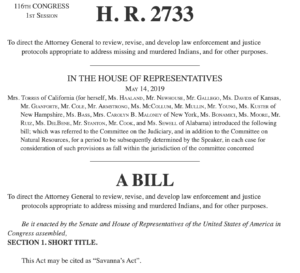
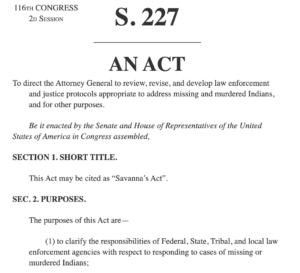
As it appears on the floor of the House of Representatives (H.R. 2733) and the Senate (S. 227) the purpose of Savanna’s Act would be “to direct the Attorney General to review, revise, and develop law enforcement and justice protocols appropriate to address missing and murdered Indians, and for other purposes.”
In more direct terms the bill is intended to improve law enforcement response to address missing and murdered American Indians and Alaskan Natives by (1) improving tribal access to federal criminal databases, (2) improving data collection on cases of missing and murdered American Indians and Alaskan Natives for reports to Congress, and (3) directing the Attorney General to review, revise, and develop law enforcement and justice guidelines with local level input.
Timeline
Aug. 2017
Savanna Greywind-Fontaine is brutally murdered.
OCT. 2017
Senate bill 1942, entitled Savanna’s Act, is introduced.
Nov. 2017
House bill 4485, entitled Savanna’s Act, is introduced.
Dec. 2018
S. 1942 passes the Senate unanimously but is “held at the desk” in the House.
Jan. 2019
Senate bill 227, entitled Savanna’s Act, is introduced.
May 2019
House bill 2733, entitled Savanna’s Act, is introduced.
The People and Process of Congress
The Committee Process
When a bill is introduced into the Senate or House of Representatives it is referred to a committee whose members specialize in the thematic area of the bill in the case of Savanna’s Act:
The House referred it to both the committee of the Judiciary and that of Natural Resources. It was then also referred to two subcommittees: the Subcommittee on Indigenous Peoples and the Subcommittee on Crime, Terrorism, and Homeland Security.
The Senate referred it only to the Committee on Indian Affairs.
The People
2017
The two main advocates for this legislation when it was first introduced were California Representative Norma Torres (D) and North Dakota Senator Heidi Heitkamp (D).
2019
Representatives Norma Torres (D-CA), Dan Newhouse (D-WA), and Deb Haaland (D-NM) reintroduced the bill in the House while Alaskan Senator Lisa Murkowski (R) did so in the Senate.
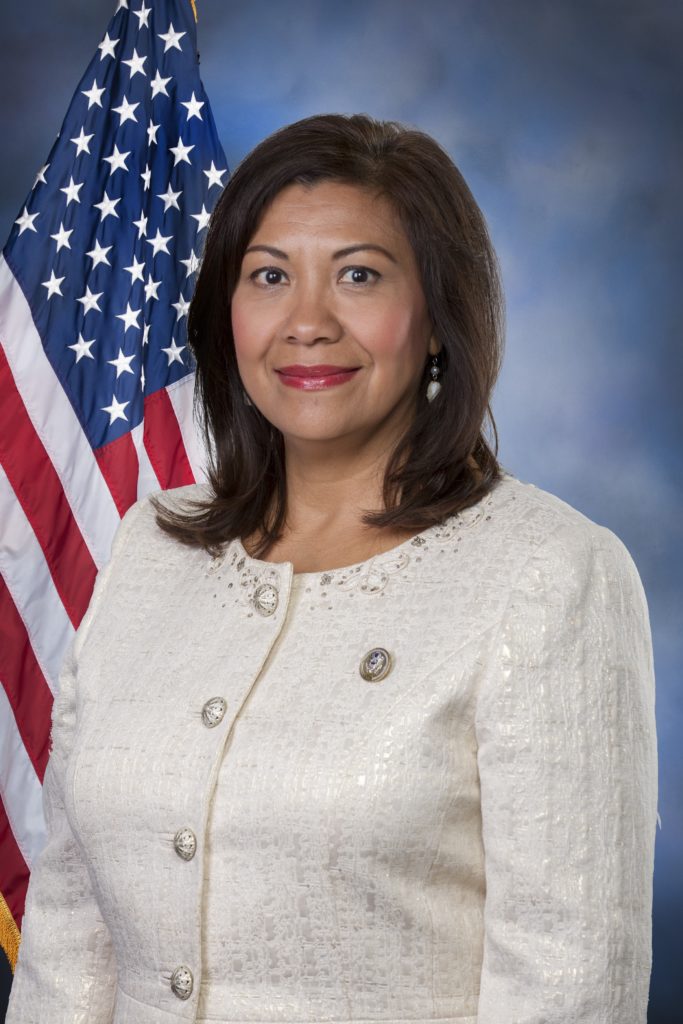
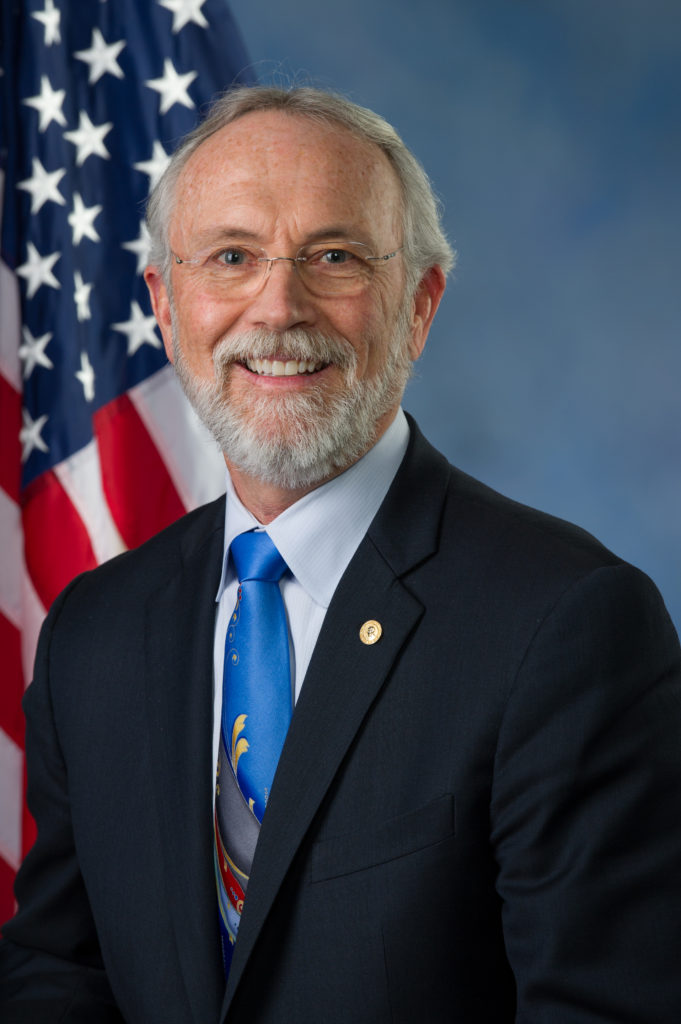
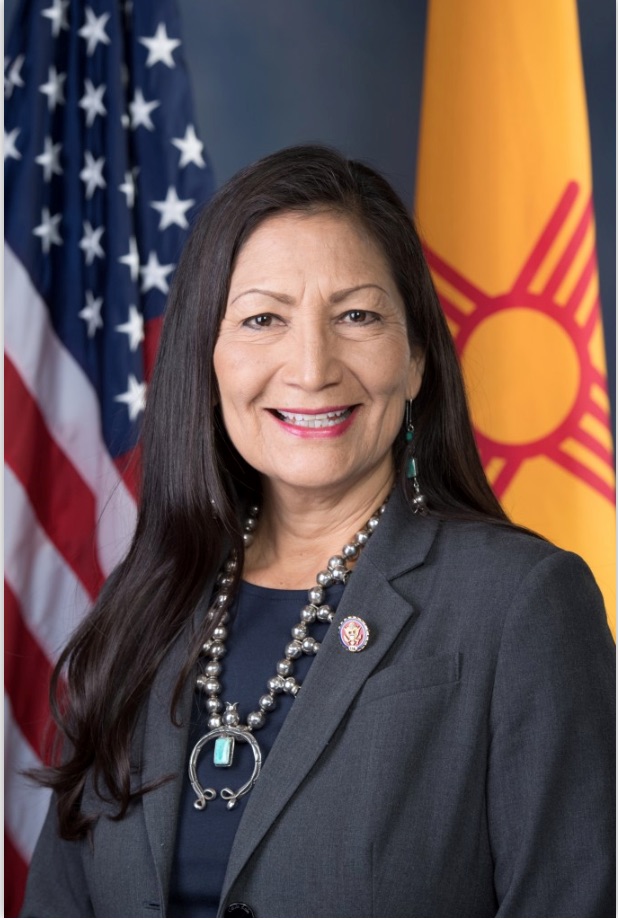
Key Members of the House of Representatives


Key Members of the Senate
From left to right: Heidi Heitkamp and Lisa Murkowski
The Potential Impacts of Passing Savanna's Act
Soft Power Solutions
Passing Savanna’s Act would:
Clarify the responsibilities of federal, state, and tribal governments in the investigation of major crimes.
Increase coordination between these different levels of government.
Increase the availability of law enforcement resources to Tribal governments and thus Tribal law enforcement.
Increase data collection and capacity on missing and murdered Indigenous men, women, and children.
Hard Power Solutions
Passing Savanna’s Act would:
Improve Tribal access to state and federal law enforcement databases.
Provide trainings and consultations so that Tribal authorities understand how to best utilize those resources.
Establish guidelines for responding to cases of missing and murdered Indigenous people.
Allocate funding in the form of grants and outlines a system of incentives so as to ensure the system is abided to.
Establishes a system of annual reporting and its requirements.
In Summary…
The Major Crimes Act (1885) placed any so termed “major crimes” committed in Indian Country under the jurisdiction of the federal government. This, added to the 1978 Supreme Court ruling in Oliphant v. Suquamish Indian Tribe further stripped tribes of their jurisdiction and has, in many ways, lead to the tragedy of missing and murdered indigenous women and girls as we see it today. As it has lead to and allowed for the various shortcomings and oversights of organizations like the FBI who were then charged to handle such cases. And while tribes have gradually won back pieces of their jurisdictional power, notably in the 2013 Violence Against Women Act provision, there is still a long way to go. Passing Savanna’s Act isn’t an all encompassing solution. However, it does address a number of the most pressing concerns and simultaneously returns a degree of control to tribes so that they may best help their people. It is an essential step forward in an issue that has claimed far too many thousands of lives.
Want to do more?
Contact your Representative today! It will only take a few minutes of your time if you follow these simple steps.
- Click here to be directed to the Find My Representative Page on house.gov
- Type in your zip code and press enter.
- Once the site directs you to your Representative simply click on their image to be directed to their official website.
- Once at their website find and dial the number of their D.C. office.
- When their office picks up recite the following:
- Hi, my name is ________ and I am calling to voice my support of H.R. 2733, also known as Savanna’s Act. It is of great importance that Representative ________ signs on as a co-sponsor. This act’s passage will help to save thousands of lives. Thank you for your time.
Want to Learn More?
Visit congress.gov and read the bill its entirety, or just click on the links below:
Urban Indian Health Institute’s Report – “Missing and Murdered Indigenous Women & Girls”
S. 227 – Savanna’s Act – 116th Congress
H.R. 2733 – Savanna’s Act – 116th Congress
Work Cited
Dalrymple, Amy. “Savanna’s Act Aims to Bring Justice for Missing, Murdered Native American Women.” Bismarck Tribune, 6 Oct. 2017, bismarcktribune.com/news/state-and-regional/savanna-s-act-aims-to-bring-justice-for-missing-murdered/article_3b0b5c17-b40d-58f3-8c34-3d30bf6fccce.html.
“General Guide to Criminal Jurisdiction in Indian Country.” Tribal Court Clearinghouse, www.tribal-institute.org/lists/jurisdiction.htm.
Heitkamp, Heidi. “Text – S.1942 – 115th Congress (2017-2018): Savanna’s Act.” Congress.gov, 10 Dec. 2018, www.congress.gov/bill/115th-congress/senate-bill/1942/text.
Hoeven, John. TO DIRECT THE ATTORNEY GENERAL TO REVIEW, REVISE, AND DEVELOP LAW ENFORCEMENT AND JUSTICE PROTOCOLS APPROPRIATE TO ADDRESS MISSING AND MURDERED INDIANS, AND FOR OTHER PURPOSES. Senate, 2018.
Monet, Jenni. “A Native American Woman’s Brutal Murder Could Lead to a Life-Saving Law.” The Guardian, Guardian News and Media, 2 May 2019, www.theguardian.com/us-news/2019/may/01/savanna-act-native-women-missing-murdered.
Murkowski, Lisa. “Text – S.227 – 116th Congress (2019-2020): Savanna’s Act.” Congress.gov, 12 Mar. 2020, www.congress.gov/bill/116th-congress/senate-bill/227/text.
“Oliphant v. Suquamish Indian Tribe, 435 U.S. 191 (1978).” Justia Law, supreme.justia.com/cases/federal/us/435/191/.
“Torres, Newhouse, Haaland Reintroduce Bipartisan Savanna’s Act.” Congresswoman Norma Torres, 14 May 2019, torres.house.gov/media-center/press-releases/torres-newhouse-haaland-reintroduce-bipartisan-savanna-s-act.
Torres, Norma. “Text – H.R.4485 – 115th Congress (2017-2018): Savanna’s Act.” Congress.gov, 9 Jan. 2018, www.congress.gov/bill/115th-congress/house-bill/4485/text.
Torres, Norma. “Text – H.R.2733 – 116th Congress (2019-2020): Savanna’s Act.” Congress.gov, 11 Mar. 2020, www.congress.gov/bill/116th-congress/house-bill/2733/text.
Urban Indian Health Institute. Missing and Murdered Indigenous Women and Girls. 2018, http://www.uihi.org/wp-content/uploads/2018/11/Missing-and-Murdered-Indigenous-Women-and-Girls-Report.pdf.